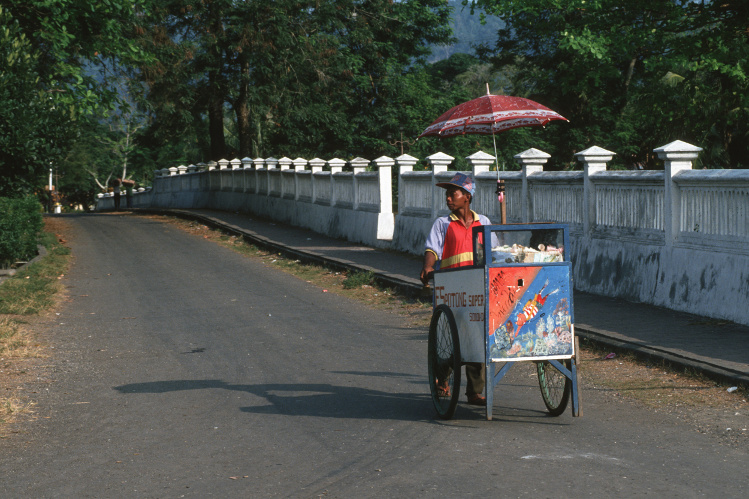
Malukan seafood is, quite simply, some of the best you could hope to eat anywhere. Deep seas, thousands of islands, and even more years of relying on protein from the deep means that the variety, freshness and preparation of seafood here can be astonishing. Wandering the pasar ikan (fish market) on the island of Ternate is the best way to acquaint yourself with this bounty. The size, number and freshness of countless species on sale (yellowfin and skipjack tuna, garfish, red snapper and more) are matched only by the avidity and expertise with which the locals snap them up from local fishermen for their cooking pots.
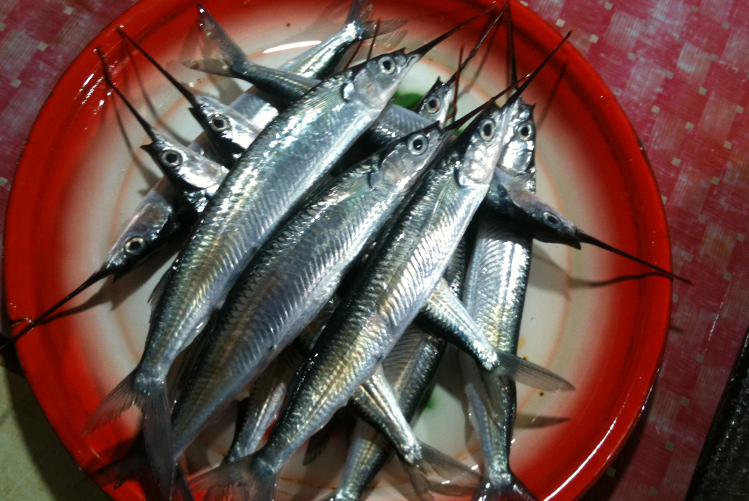
Gohu Ikan is also known as Ternatean sashimi. Raw pieces of skipjack tuna (or yellowfin when available) are ‘cooked’ in the acidic juice of calamansi (a local citrus like a cross between a lemon and a Seville orange). Basil, peanuts, chili and shallots are added (the last two warmed in coconut oil), and it’s ready to be scooped onto wedges of steamed cassava. Try it at Ternate's Kedai Mita (Jl Stadion).
Ikan Bakar (grilled fish) may not be unique to Maluku, but plucked from the sea and grilled to smoky, sweet-fleshed perfection over coconut coals, it's especially good here. The fish is inevitably accompanied by colo colo (or dabu dabu), a ubiquitous dressing made with shallots, fruity (but powerful) green chillies and Maluku’s greenish, flavour-packed tomatoes. Depending on where you eat it, it may also have varying amounts of soy, sugar or lime juice. You shouldn’t find bad ikan bakar anywhere, but Pondok Indah (Jl Tobelo), near Tobelo in North Halmahera, does it exceptionally well.
Ikan Woku Belanga shows the influence of North Sulawesi on North Malukan food. The twist in this more elaborate fish dish, is the use of local kenari nuts rather than candlenuts in a spice paste of shallots, ginger, garlic and turmeric. Finished with lemongrass, lime and turmeric leaves, tomatoes and chillies, it’s a stunning way to treat Maluku’s superb white-fleshed fish. Try it at Florida on Ternate.
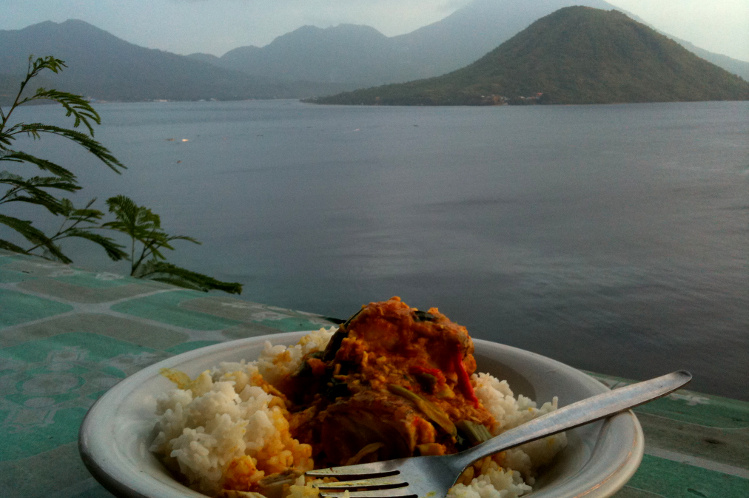
Maluku’s historical reliance on staples other than rice lives on in the unofficial regional dish: papeda (also known as popeda in Ternate). The heart of mature sago trees is extracted, turned into a pulpy ‘flour’, then boiled to make the thick mucilaginous porridge that is papeda. The interest lies in the accompaniments: turmeric-stained fish soup, fresh herbs, stewed and stir-fried vegetables (kangkung, a type of water spinach, is omnipresent) sambals and more fish. A restaurant that specialies in popeda, like Ternate’s Rumah Makan Popeda Gamalama, is the best place to broaden your foodie horizons.
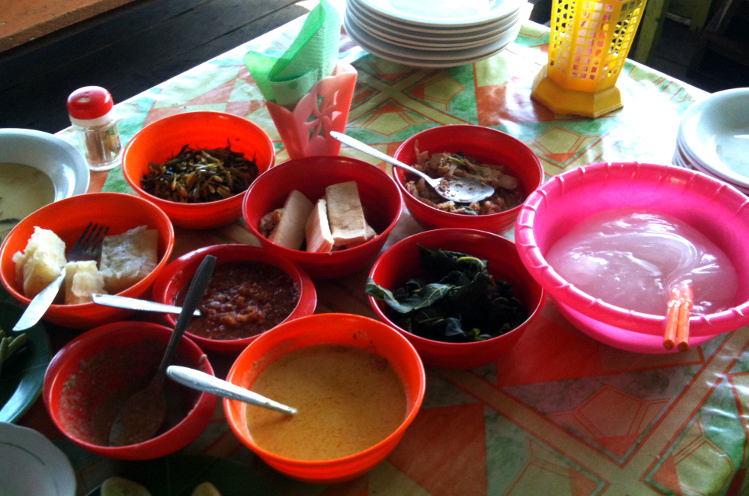
While a tropical region like Maluku obviously has no tradition of wine-making (that said, some very decent wines are being produced in Southeast Asia these days), the human ingenuity for cooking up pleasant intoxicants gave rise to sopi, a powerful, twice-distilled coconut liquor that Kei Islanders love with a passion. Smoother and more refined than you might expect, it’s generally decanted into cleaned water bottles and sold for a song. Get to know some locals, and ask if they can introduce you to its delights.
Departures from the tooth-tingling sweetness of Indonesian kopi (coffee) are to be found in Ambon, a city with a serious caffeine habit. Beans from other parts of Indonesia are appreciated for their distinctive qualities and rumah kopi (coffeeshops) such as Kopi Tradisi Joas (Jl Said Perintah, Ambon) guard their ‘secret-recipe’ preparations closely.
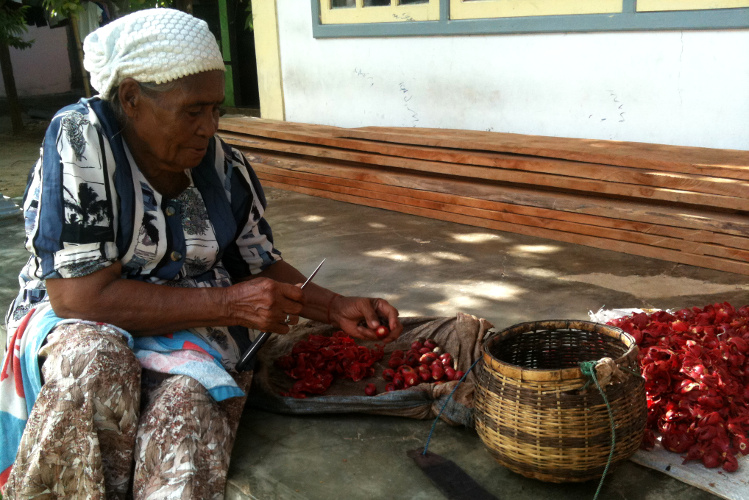
The delicious array of cakes and sweet treats served in Ambon’s rumah kopi bears some trace of European and Chinese bakery, yet is distinctively Ambonese. The dense, almost fruity Ambonese bread ampas terigu could be a yeast bun, but is actually started with fermented sago, then flavoured with coconut and brown sugar. Other sweet favourites include koyabu (steamed cassava cake) tart pisang (banana tart) and pulut siram (sticky rice with brown sugar), all of which can be washed down with a fiery cup of rarobang (ginger coffee with spices and kenari nuts) at delightful Ambon institution Sibu Sibu (Jl Said Perintah 47A).
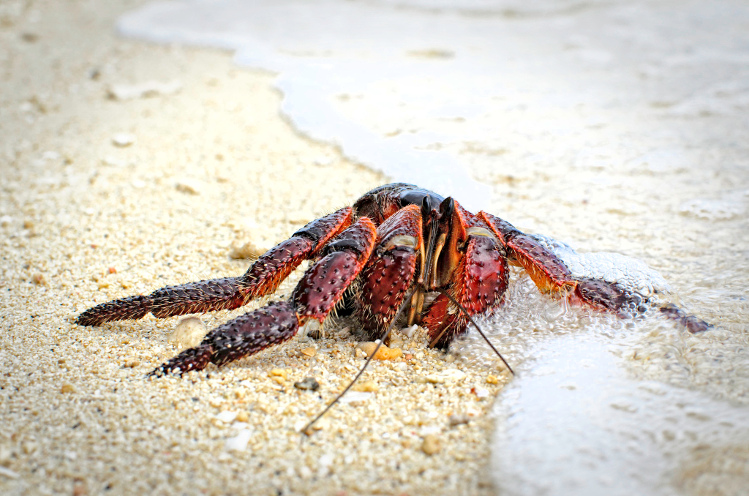
Inevitably, given Maluku’s isolation and unique flora and fauna, the locals have developed a few outlandish tastes. Bakasem is a Bandanese dish, in which tuna intestines are salted, mixed with coconut wine then placed in a bottle, in the sun, for several days.It is designed to be eaten with mango, chillies, papaya leaves and an open mind. Ask around for availability - if you dare.
The kepiting ketam, or ‘coconut crab’ (named for its ability to strip and crack its favourite food) is the largest terrestrial arthropod in the world. Until recently a popular Ternatean delicacy, the crabs, which Malukans sometimes call kepiting kenari after the local nut which its sweet flesh supposedly resembles, are are now protected. So while it's still possible to procure them for a price, we can't recommend it; these intelligent animals can live up to 60 years, and populations aren’t easily replenished.